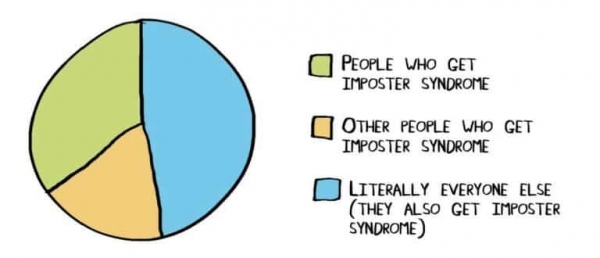Everyone feels like an imposter sometimes, and that’s okay…

Why so few female applicants for an MD position? Imposter Syndrome?
I recently ran an advertisement in several on-line media for a Managing Director for a 19 branch retail chain. Of the 91 applications only 6 came from female candidates and we wondered why.
To our mind, retail management has no gender bias. Female CEO’s exist at John Lewis, Coop, Bravissimo, Harvey Nicholls, White Stuff, Jimmy Choo and there are many more so why were only 6.5% of our applications from female candidates?
We are confident it wasn’t the text of the advertisement which was entirely neutral so we asked some female senior managers for their opinion and the majority mentioned imposter syndrome. We don’t absolutely know if this was the cause but Imposter Syndrome is considered to be a factor that is more limiting to women than men when applying for jobs and even more limiting to people of colour. One female MD said that men will apply to job adverts when they know they only have a few of the required qualities but women will only apply for a job if they have all of the required qualities. At Cavendish Maine we work hard to remove conscious and unconscious prejudice from recruitment processes so wanted to learn more about Imposter Syndrome.
Bupa defines Imposter Syndrome as:
A form of ‘intellectual self-doubt’, when you don’t believe your achievements are real. It was first described in high-achieving women in 1978, but anyone can be affected, whatever their job.
People with imposter syndrome tend to be intelligent and high achievers. They’re also likely to be perfectionists, feeling self-doubt whenever something doesn’t go as planned. Or even when things do go as planned, they may still feel that they could have done better. They may put things off, always looking for ‘extra information’ before they start a task as they worry about looking stupid if they don’t know something.
The Journal of Business and Psychology reported that:
Individuals that have impostor syndrome always attribute their success to either luck, influence, or other people, instead of accepting that they are competent and their hard work paid off. Thus, they believe that they will have to work harder than others to prove themselves. Small and big successes achieved by people with impostor syndrome will trigger an impostor cycle. They will become bothered that their abilities will be scrutinised to reveal a level of incompetence. If you find yourself always avoiding extra responsibilities that could hone your skills while opting for a familiar duty that you have developed, then you may have impostor syndrome.
It appears that a lack of role models fuels Imposter Syndrome and until men and women across all ethnic groups are equally represented in all senior roles, some job seekers will have self-doubt over their ability to secure or succeed in a promotion or a more senior job application.
If this could be you, LinkedIn published a good article that offered some solutions: (18) Imposter Syndrome in the Job Search | LinkedIn
